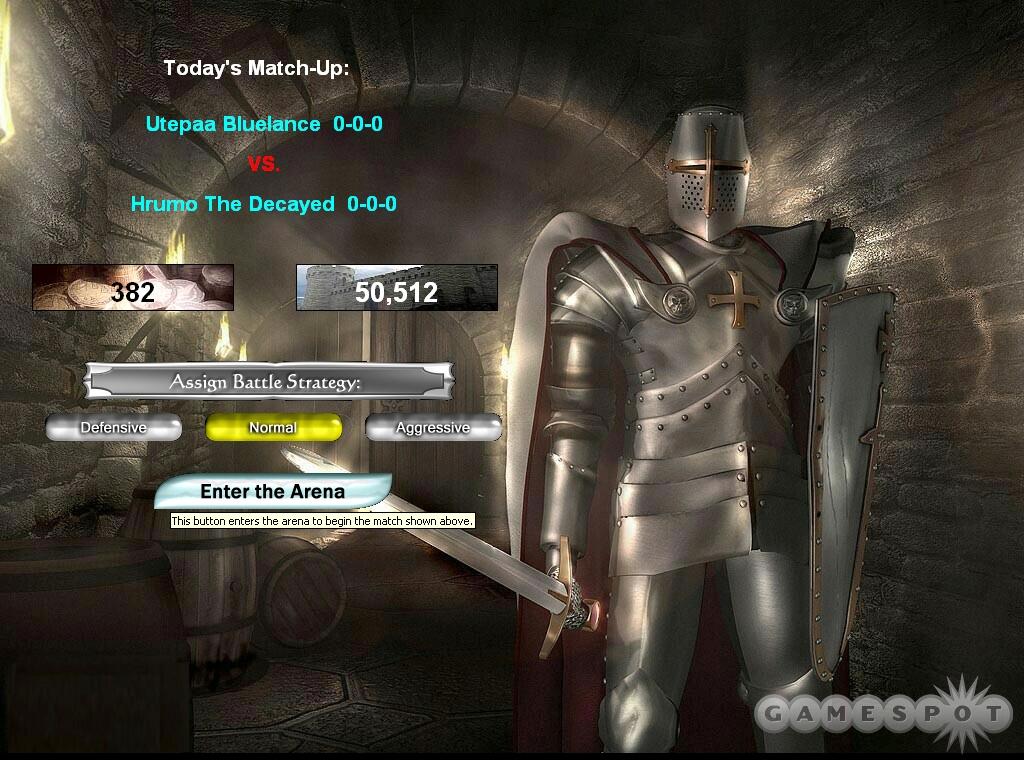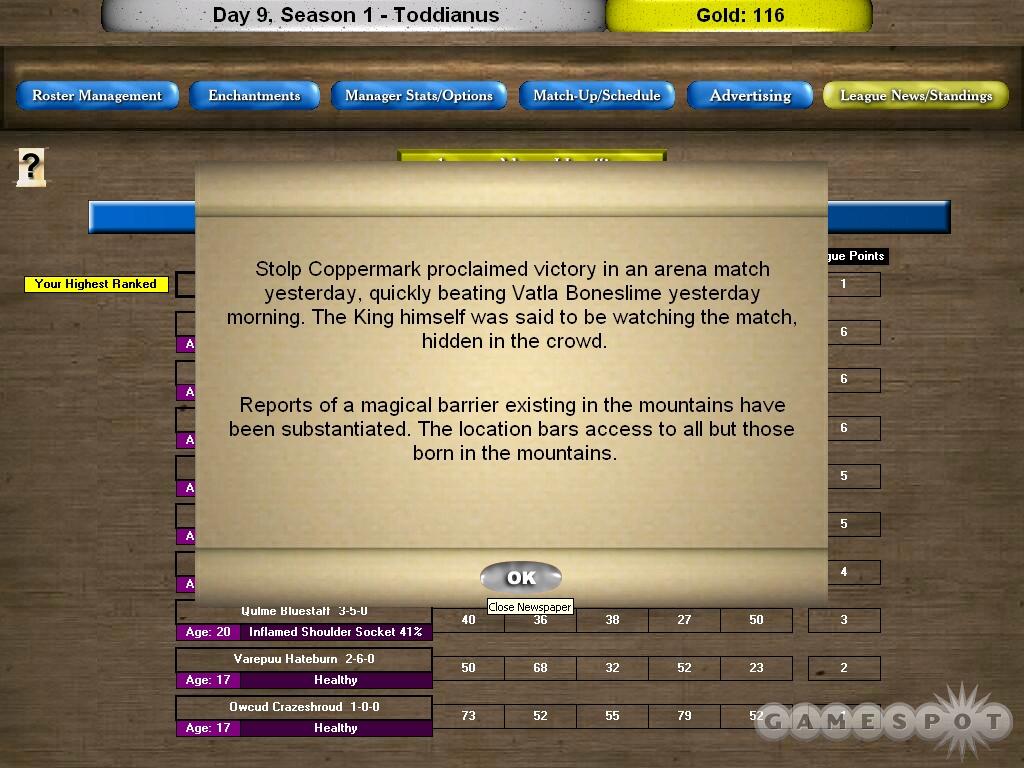Game concepts don't get much better than this. Take a standard text-based sports management title and replace the baseball or football with gladiatorial games. Yes, home runs and touchdowns may be pretty exciting, but they don't quite compare to blood sport when it comes to visceral stimulation. Or at least that's the theory. The reality, as expressed by gladiatorial management sim Coliseum, is surprisingly dull and is lacking in both personality and depth.

There just isn't enough here to hold your interest for long, despite the intriguing premise. Taking on the role of a gladiator manager who's looking after a team of three warriors in a 40-day season that leads to a championship tournament certainly seems promising at the outset. The object of the game, of course, is to sign and train the top warriors in the circuit, wipe out the opposition in the arena, make some gold by drawing big crowds, and keep the bloodthirsty populace entertained. There are some role-playing elements--since you'll roll your in-game avatar's loyalty, performance, reputation, development, and healing statistics--but the focus is on building a team of talented fighters who are able to scrap like Russell Crowe in Gladiator.
Yet gladiatorial life has never seemed so boring. Opportunities to develop warriors are limited. Training is available, although there are just two methods for working on each of a fighter's five attributes, which include strength, speed, agility, durability, and intangibles. To increase strength, for instance, you can order up some weight lifting, while to boost speed you can call for wind sprints. Furthermore, to add to the intangibles, you can send your warrior to charm school. There are also two additional training selections that give promising youngsters the chance to work with veterans to buff up their skills across the board.
All of these options cost gold, of course, so you have to be discreet regarding who gets to pump iron and run laps. But aside from this, there isn't much to plan out because you have just three gladiators to manage at any one time. And since one of these has to be designated as your primary warrior, you only have to worry about training two. Training also takes some time to show results, so you don't have to revisit your choices very often. Needless to say, this really cuts down on the decision making. It also stands in stark contrast to traditional sports management titles, because in the typical baseball or football game you have to deal with at least a couple of dozen players who are entering training camp each year.
Additionally, warriors in Coliseum come with few distinguishing features. Their stats are nice as a starting point, but there isn't anything beyond that to allow you to identify with them. There are no biographies, and there are no obvious categories for attitude or personality. Don't expect to care much when one takes an accidental shot to a "pressure point" and keels over dead in the arena. Personal characteristics apparently do come into play at times. For example, according to the in-game help files, a manager's high loyalty score is supposed to make fighters with an "attitude" easier to handle. However, it's impossible to see any evidence of these mechanisms in action because many key ratings, such as potential and troublemaker, are hidden. In the end, only warrior names stand out, and this is not a good thing. All of the default names in the game are embarrassing fantasy clichés of a sort that you might have found cool when naming D&D characters in eighth grade. It's hard to see what the appeal of monikers like Vatla Boneslime and Upuke Chaoslaugh would be to the presumably adult developers at Stormcloud Creations.
Other management options are equally superficial. Warriors can be buffed up before going in to a fight with expensive potions that raise attribute skills, but there are only three types of these concoctions, and they vary only by strength and possibility of harmful side effect. You can also pay for enchantments to increase attributes. Again, choices here are very limited, and most of the available spells are less than enthralling. A good example of the selection here is "vampiric bond," which is an insurance policy of sorts that increases all stats of surviving warriors by two whenever one of their colleagues is killed in action.
There are standings to follow and news reports to look over after each day of action, but the latter is worthless because of a concentration on meaningless trivia about such things as the king's depression-suffering nephew. Current events also aren't synced with battles, so you can emerge from a fight on the hottest day of the year to find that the top news story is "the coldest winter in living memory." Finally, you can tweak the attendance and rake in gold by advertising, although there are just a handful of venues from which to choose. Essentially, you can either go the cheap route by using posters, or you can pay big bucks to get a message in to the coliseum program. Likewise, you can pay big bucks to have a note sent to the king's court.
Of course, the lack of management depth might be at least partially forgivable if Coliseum boasted an impressive combat engine. But it doesn't. Battle sequences are even more disappointing than the rest of the game, largely because there is little to do but watch them unfold. Tactics consist of choosing a defensive, normal, or aggressive approach to the fight and then clicking your mouse button. From there, you simply read a repetitive, grammatically challenged play-by-play that details each lunge and thrust; you listen to excruciatingly overacted "Oof!" and "Argh!" sound bites when weapons strike home; and you wait for one warrior's pool of willpower points to be reduced to zero. It's similar to watching combat in a game of tabletop D&D but without the pulse-pounding thrills of getting to see someone roll dice.

Visuals and sound also go easy on the thrills. Menu screens consist mostly of white text atop beige backdrops with a texture that mimics papyrus, which is a combination that's been almost calculated to put you to sleep. What few graphics are present are based on a medieval theme, which includes a battle-loading screen that features a knight who's decked out like he's on his way to the Crusades. Such pictures seem wildly out of place, especially considering the Roman associations with the game's title and the presence of a helmeted Roman gladiator on the game's box. Audio quality isn't any better. Along with the aggravating grunts and groans noted above, the game features a musical score that consists of airy tones that are usually found on a CD that comes with a picture of waterfalls on the cover. You might actually need to listen to such a relaxation disc after spending some time with Coliseum.
Sloppy, shallow, and ultimately forgettable, the game never lives up to its undeniably catchy concept.